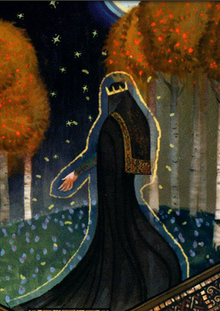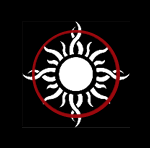Tag: sourceedit |
m (fix links) Tag: apiedit |
||
| Line 19: | Line 19: | ||
As of the present day, the Maker has long since left the world. The Chantry teaches that one day, when the [[Chant of Light]] is sung from all the corners of the world, the Maker will finally return and transform the world into a paradise. Until that day, however, He only watches for those few who follow Andraste's teachings. When they die, the Maker brings them to his side. All others wander the Fade throughout eternity, forever lost to the Maker's sight. The Chantry refers to this state as "Oblivion." The motive to create paradise in the world by spreading the Chant is often cited as the reason the Chantry called an [[Exalted March]] against the elves of the Dales, who refused to worship a 'human' god, or others against the Tevinter Imperium where the Chant has been deemed as corrupted in favor of their magister rulers to regain their leadership as in the old days before the first [[Blight]]. |
As of the present day, the Maker has long since left the world. The Chantry teaches that one day, when the [[Chant of Light]] is sung from all the corners of the world, the Maker will finally return and transform the world into a paradise. Until that day, however, He only watches for those few who follow Andraste's teachings. When they die, the Maker brings them to his side. All others wander the Fade throughout eternity, forever lost to the Maker's sight. The Chantry refers to this state as "Oblivion." The motive to create paradise in the world by spreading the Chant is often cited as the reason the Chantry called an [[Exalted March]] against the elves of the Dales, who refused to worship a 'human' god, or others against the Tevinter Imperium where the Chant has been deemed as corrupted in favor of their magister rulers to regain their leadership as in the old days before the first [[Blight]]. |
||
| − | Although a great many people believe in the Maker, there are also many who do not; [[Chasind]], the [[Dalish|Dalish elves]], the followers of the [[Qun]], most dwarves and several dragon cults are some of the most obvious examples. [[Morrigan]] is prone to having elaborate philosophical discussions with [[Leliana]] on the matter, the Dalish struggle to maintain their worship of their Pantheon of gods in an effort to reclaim their lost lore, the [[Qunari]] are unyielding in their efforts to spread the teachings of their philosopher [[Ashkaari Koslun|Koslun]] to what they deem "unenlightened" races plagued by chaos and lack of order, while non-[[surface dwarves]] are too mired in their old traditions of ancestor worship, and they simply don't care about the superstitions of humans and other races. |
+ | Although a great many people believe in the Maker, there are also many who do not; [[Chasind Wilder|Chasind]], the [[Dalish|Dalish elves]], the followers of the [[Qun]], most dwarves and several dragon cults are some of the most obvious examples. [[Morrigan]] is prone to having elaborate philosophical discussions with [[Leliana]] on the matter, the Dalish struggle to maintain their worship of their Pantheon of gods in an effort to reclaim their lost lore, the [[Qunari]] are unyielding in their efforts to spread the teachings of their philosopher [[Ashkaari Koslun|Koslun]] to what they deem "unenlightened" races plagued by chaos and lack of order, while non-[[surface dwarves]] are too mired in their old traditions of ancestor worship, and they simply don't care about the superstitions of humans and other races. |
[[Justice]] claims that spirits do not know whether the Maker exists, and that demons do not care. He also suggests that the spirits who believe in the Maker may do so only because they saw Him in the dreams of mortals. Some demons have also claimed that the existence of the Golden City and the Maker is false, and deemed the Chant of Light as pedantic and foolish. |
[[Justice]] claims that spirits do not know whether the Maker exists, and that demons do not care. He also suggests that the spirits who believe in the Maker may do so only because they saw Him in the dreams of mortals. Some demons have also claimed that the existence of the Golden City and the Maker is false, and deemed the Chant of Light as pedantic and foolish. |
||
Revision as of 23:55, 11 May 2015

An image of the Maker from the visions of Andraste.[1]
There was no word
For heaven or for earth, for sea or sky
All that existed was silence
Then the Voice of the Maker rang out
The first Word
And His Word became all that might be
—Threnodies 5:1–8
The Maker is the deity worshipped by the Chantry. He is referred to as a male, and the prophetess Andraste, who inspired the foundation of the Chantry, is considered to be His wife. While the Chantry believes that the Maker is all-powerful and created all things, He has also turned away from them. The Chantry believes this to be because of the faults of His creations. He will not answer prayers, grant wishes or anything of the sort, until humanity proves itself worthy of His attention again. As such, Andrastian religion in Thedas can be described as deistic in that the world (or Thedas at least) was abandoned by the Maker and he will not heed prayer or perform any other function until his favor is regained.
Background

A sun blazing within a circle is used as the symbol of the Maker.
It is said that long ago, the Maker created the Fade as His first world. His first children were the spirits of the Fade, made in His own image. However, the Maker turned away from His first children, because while the spirits could alter their world at will, they lacked a soul and could only imitate what they saw, being unable to create or imagine anything new for themselves. Dissatisfied with the result, the Maker left the Fade behind, creating the world of Thedas instead and its inhabitants. He separated it from the first world by putting the Veil in between them, not realizing that His first children would be able to observe His new children and grow envious of them.
The children that populated this new realm had the spark of the divine within them, which pleased the Maker; according to the Chantry, the dwarves were not among His creations.[2] While their world was more solid than that of the spirits, these creatures were able to imagine, and dream new things because of it. But then the First Sin was committed: malevolent beings whispered to the men of the new world from across the Veil, and turned them to the worship of the Old Gods, ancient entities who contested the Maker for power. After imprisoning the Old Gods underground, the Maker turned away from mankind, and departed from the Golden City. He despaired, for His first children had no urge to create and His second children created sin.[3] But the Old Gods still whispered to men, and taught them blood magic. The magisters of the Tevinter Imperium used the knowledge of the Old Gods to enter the Golden City, believing that they were superior to the Maker. But they instead blackened the Golden City and were cast back to earth by the Maker, transforming them into ravenous monsters that corrupted all they touched: the first darkspawn. Much later on, Andraste managed to convince the Maker to forgive his creations, but Andraste was betrayed by her mortal husband Maferath, and burned at the stake. The Maker turned away from mankind once more.
As of the present day, the Maker has long since left the world. The Chantry teaches that one day, when the Chant of Light is sung from all the corners of the world, the Maker will finally return and transform the world into a paradise. Until that day, however, He only watches for those few who follow Andraste's teachings. When they die, the Maker brings them to his side. All others wander the Fade throughout eternity, forever lost to the Maker's sight. The Chantry refers to this state as "Oblivion." The motive to create paradise in the world by spreading the Chant is often cited as the reason the Chantry called an Exalted March against the elves of the Dales, who refused to worship a 'human' god, or others against the Tevinter Imperium where the Chant has been deemed as corrupted in favor of their magister rulers to regain their leadership as in the old days before the first Blight.
Although a great many people believe in the Maker, there are also many who do not; Chasind, the Dalish elves, the followers of the Qun, most dwarves and several dragon cults are some of the most obvious examples. Morrigan is prone to having elaborate philosophical discussions with Leliana on the matter, the Dalish struggle to maintain their worship of their Pantheon of gods in an effort to reclaim their lost lore, the Qunari are unyielding in their efforts to spread the teachings of their philosopher Koslun to what they deem "unenlightened" races plagued by chaos and lack of order, while non-surface dwarves are too mired in their old traditions of ancestor worship, and they simply don't care about the superstitions of humans and other races.
Justice claims that spirits do not know whether the Maker exists, and that demons do not care. He also suggests that the spirits who believe in the Maker may do so only because they saw Him in the dreams of mortals. Some demons have also claimed that the existence of the Golden City and the Maker is false, and deemed the Chant of Light as pedantic and foolish.
Customs and Culture
Wintersend was an ancient Tevinter holiday which has now become a celebration of the Maker. It stands for the end of winter in many lands and coincides with tourneys and contests at the Proving Grounds in Minrathous. In southern lands, this holiday has become a day of gathering for trade, theater, and, in some areas, the arrangement of marriages. It is celebrated at the beginning of Pluitanis.
Trivia
- According to Mike Laidlaw, the purpose of the Maker in the Dragon Age series is "faith," even in the unseen.[4]
See also
![]() Codex entry: The Commandments of the Maker
Codex entry: The Commandments of the Maker
References
- ↑
 Dragon Age: The World of Thedas, vol. 1, p. 112
Dragon Age: The World of Thedas, vol. 1, p. 112
- ↑
 Dragon Age: The World of Thedas, vol. 1, p. 143
Dragon Age: The World of Thedas, vol. 1, p. 143
- ↑ Dragon Age: Origins Collector's Edition: Prima Official Game Guide
- ↑ Mike Laidlaw twitter
| ||||||||||||||||||||||||

